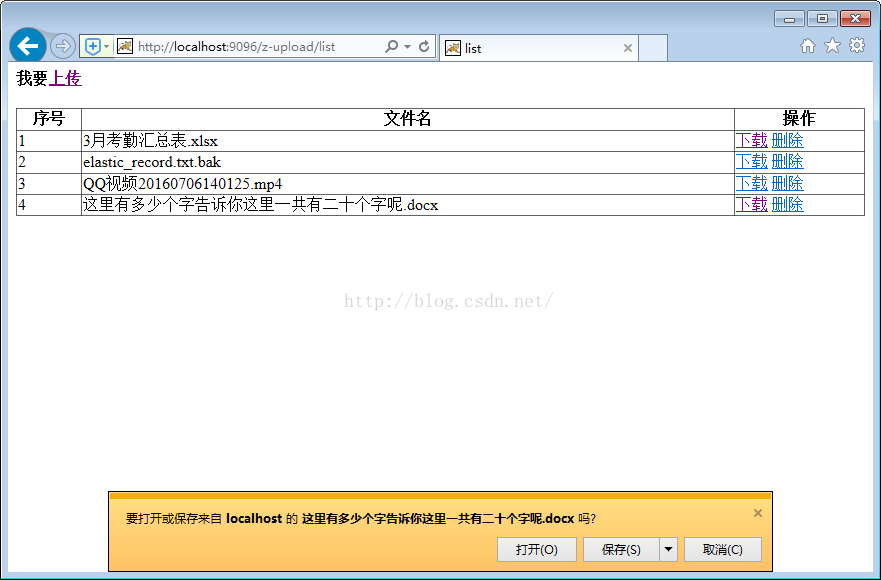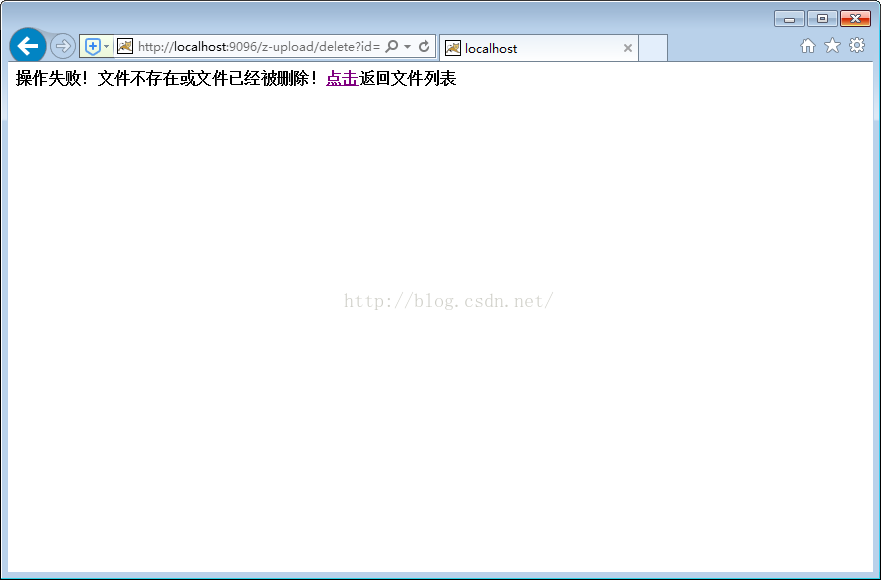java基于servlet编写上传下载功能 类似文件服务器
本人闲来无事,写了个servlet,实现上传下载功能。启动服务后,可以在一个局域网内当一个小小的文件服务器。
一、准备工作
下载两个jar包:
commons-fileupload-1.3.1.jar
commons-io-2.2.jar
二、创建一个web工程
我的工程名叫:z-upload
三、配置web.xml
<?xml version="1.0" encoding="UTF-8"?> <web-app xmlns:xsi="http://www.w3.org/2001/XMLSchema-instance" xmlns="http://java.sun.com/xml/ns/javaee" xsi:schemaLocation="http://java.sun.com/xml/ns/javaee http://java.sun.com/xml/ns/javaee/web-app_3_0.xsd" id="WebApp_ID" version="3.0"> <display-name>z-upload</display-name> <servlet> <servlet-name>UploadService</servlet-name> <servlet-class>com.syz.servlet.UploadService</servlet-class> </servlet> <servlet-mapping> <servlet-name>UploadService</servlet-name> <url-pattern>/*</url-pattern> </servlet-mapping> </web-app>
从以上配置可以看出,我的servlet类是UploadService,匹配的url是/*,意思是匹配所有访问url。
四、写servlet类
package com.syz.servlet;
import java.io.File;
import java.io.FileInputStream;
import java.io.FileOutputStream;
import java.io.IOException;
import java.io.InputStream;
import java.io.OutputStream;
import java.io.PrintWriter;
import java.text.SimpleDateFormat;
import java.util.Date;
import java.util.Iterator;
import java.util.List;
import javax.servlet.ServletContext;
import javax.servlet.ServletException;
import javax.servlet.http.HttpServlet;
import javax.servlet.http.HttpServletRequest;
import javax.servlet.http.HttpServletResponse;
import org.apache.commons.fileupload.FileItem;
import org.apache.commons.fileupload.FileUploadException;
import org.apache.commons.fileupload.ProgressListener;
import org.apache.commons.fileupload.disk.DiskFileItemFactory;
import org.apache.commons.fileupload.servlet.ServletFileUpload;
public class UploadService extends HttpServlet {
public static final String LIST = "/list";
public static final String FORM = "/form";
public static final String HANDLE = "/handle";
public static final String DOWNLOAD = "/download";
public static final String DELETE = "/delete";
public static final String UPLOAD_DIR = "/upload";
private static final long serialVersionUID = 2170797039752860765L;
public void execute(HttpServletRequest req, HttpServletResponse resp)
throws ServletException, IOException {
System.out.println("execute...");
System.out.println("------------begin---------------");
req.setCharacterEncoding("UTF-8");
String host = req.getRemoteHost();
System.out.println("host:" + host);
String uri = req.getRequestURI();
System.out.println("uri:" + uri);
ServletContext servletContext = this.getServletConfig()
.getServletContext();
// 上传文件的基本路径
String basePath = servletContext.getRealPath(UPLOAD_DIR);
// 上下文路径
String contextPath = servletContext.getContextPath();
System.out.println("contextPath:" + contextPath);
// 截取上下文之后的路径
String action = uri.substring(contextPath.length());
System.out.println("action:" + action);
// 依据action不同进行不同的处理
if (action.equals(FORM)) {
form(contextPath, resp);
}
else if (action.equals(HANDLE)) {
boolean isMultipart = ServletFileUpload.isMultipartContent(req);
System.out.println("isMultipart:" + isMultipart);
if (!isMultipart) {
return;
}
DiskFileItemFactory factory = new DiskFileItemFactory();
File repository = (File) servletContext
.getAttribute(ServletContext.TEMPDIR);
System.out.println("repository:" + repository.getAbsolutePath());
System.out.println("basePath:" + basePath);
factory.setSizeThreshold(1024 * 100);
factory.setRepository(repository);
ServletFileUpload upload = new ServletFileUpload(factory);
// 创建监听
ProgressListener progressListener = new ProgressListener() {
public void update(long pBytesRead, long pContentLength,
int pItems) {
System.out.println("当前文件大小:" + pContentLength + "\t已经处理:"
+ pBytesRead);
}
};
upload.setProgressListener(progressListener);
List<FileItem> items = null;
try {
items = upload.parseRequest(req);
System.out.println("items size:" + items.size());
Iterator<FileItem> ite = items.iterator();
while(ite.hasNext()){
FileItem item = ite.next();
if(item.isFormField()){
// handle FormField
}else{
// handle file
String fieldName = item.getFieldName();
String fileName = item.getName();
fileName = fileName.substring(
fileName.lastIndexOf(File.separator) + 1);
String contentType = item.getContentType();
boolean isInMemory = item.isInMemory();
long sizeInBytes = item.getSize();
System.out.println(fieldName + "\t" + fileName + "\t"
+ contentType + "\t" + isInMemory + "\t"
+ sizeInBytes);
File file = new File(
basePath + "/" + fileName + "_" + getSuffix());
// item.write(file);
InputStream in = item.getInputStream();
OutputStream out = new FileOutputStream(file);
byte[] b = new byte[1024];
int n = 0;
while ((n = in.read(b)) != -1) {
out.write(b, 0, n);
}
out.flush();
in.close();
out.close();
}
}
// 处理完后重定向到文件列表页面
String href1 = contextPath + LIST;
resp.sendRedirect(href1);
}
catch (FileUploadException e) {
e.printStackTrace();
}
catch (Exception e) {
e.printStackTrace();
}
}
else if (action.equals(LIST)) {
list(contextPath, basePath, resp);
}
else if (action.equals(DOWNLOAD)) {
String id = req.getParameter("id");
System.out.println("id:" + id);
if (id == null) {
return;
}
File file = new File(basePath);
File[] list = file.listFiles();
int len = list.length;
boolean flag = false;
for (int i = 0; i < len; i++) {
File f = list[i];
String fn = f.getName();
if (f.isFile() && fn.lastIndexOf("_") > -1) {
String fid = fn.substring(fn.lastIndexOf("_"));
if (id.equals(fid)) {
download(f, resp);
flag = true;
break;
}
}
}
if (!flag) {
notfound(contextPath, resp);
}
}
else if (action.equals(DELETE)) {
String id = req.getParameter("id");
System.out.println("id:" + id);
if (id == null) {
return;
}
File file = new File(basePath);
File[] list = file.listFiles();
int len = list.length;
boolean flag = false;
for (int i = 0; i < len; i++) {
File f = list[i];
String fn = f.getName();
if (f.isFile() && fn.lastIndexOf("_") > -1) {
String fid = fn.substring(fn.lastIndexOf("_"));
if (id.equals(fid)) {
f.delete();
flag = true;
break;
}
}
}
if (flag) {
// 处理完后重定向到文件列表页面
String href1 = contextPath + LIST;
resp.sendRedirect(href1);
}
else {
notfound(contextPath, resp);
}
}
else {
show404(contextPath, resp);
}
System.out.println("------------end---------------");
}
private void show404(String contextPath, HttpServletResponse resp)
throws IOException {
resp.setContentType("text/html;charset=utf-8");
PrintWriter out = resp.getWriter();
String href1 = contextPath + LIST;
out.write("<html>");
out.write("<head><title>404</title></thead>");
out.write("<body>");
out.write("<b>您所访问的页面不存在!<a href='" + href1 + "'>点击</a>返回文件列表</b>");
out.write("</body>");
out.write("</html>");
out.close();
}
private void form(String contextPath, HttpServletResponse resp)
throws IOException {
resp.setContentType("text/html;charset=utf-8");
PrintWriter out = resp.getWriter();
String href1 = contextPath + LIST;
out.write("<html>");
out.write("<head><title>form</title></thead>");
out.write("<body>");
out.write("<b><a href='" + href1 + "'>点击</a>返回文件列表</b>");
out.write(
"<form action='handle' method='post' enctype='multipart/form-data' style='margin-top:20px;'>");
out.write("<input name='file' type='file'/><br>");
out.write("<input type='submit' value='上传'/><br>");
out.write("</form>");
out.write("</body>");
out.write("</html>");
out.close();
}
private void notfound(String contextPath, HttpServletResponse resp)
throws IOException {
resp.setContentType("text/html;charset=utf-8");
PrintWriter out = resp.getWriter();
String href1 = contextPath + LIST;
out.write("<html><body><b>操作失败!文件不存在或文件已经被删除!<a href='" + href1
+ "'>点击</a>返回文件列表</b></body></html>");
out.close();
}
private void download(File f, HttpServletResponse resp)
throws IOException {
String fn = f.getName();
String fileName = fn.substring(0, fn.lastIndexOf("_"));
System.out.println("fileName:" + fileName);
resp.reset();
resp.setContentType("application/octet-stream");
String encodingFilename = new String(fileName.getBytes("GBK"),
"ISO8859-1");
System.out.println("encodingFilename:" + encodingFilename);
resp.setHeader("content-disposition",
"attachment;filename=" + encodingFilename);
InputStream in = new FileInputStream(f);
OutputStream out = resp.getOutputStream();
byte[] b = new byte[1024];
int n = 0;
while ((n = in.read(b)) != -1) {
out.write(b, 0, n);
}
out.flush();
in.close();
out.close();
}
private void list(String contextPath, String basePath,
HttpServletResponse resp)
throws IOException {
String href_u = contextPath + FORM;
resp.setContentType("text/html;charset=utf-8");
PrintWriter out = resp.getWriter();
out.write("<html>");
out.write("<head><title>list</title></thead>");
out.write("<body>");
out.write("<b>我要<a href='" + href_u + "'>上传</a></b><br>");
out.write(
"<table border='1' style='border-collapse:collapse;width:100%;margin-top:20px;'>");
out.write("<thead>");
out.write("<tr>");
out.write("<th>序号</th><th>文件名</th><th>操作</th>");
out.write("</tr>");
out.write("</thead>");
out.write("<tbody>");
File file = new File(basePath);
File[] list = file.listFiles();
System.out
.println("basePath:" + basePath + "\tlist.size:" + list.length);
int len = list.length;
int no = 1;
for (int i = 0; i < len; i++) {
File f = list[i];
System.out.println(i + "\t" + f.getName());
String fn = f.getName();
if (f.isFile() && fn.lastIndexOf("_") > -1) {
String filename = fn.substring(0, fn.lastIndexOf("_"));
String id = fn.substring(fn.lastIndexOf("_"));
String href1 = contextPath + DOWNLOAD + "?id=" + id;
String href2 = contextPath + DELETE + "?id=" + id;
StringBuilder sb = new StringBuilder();
sb.append("<tr>");
sb.append("<td>");
sb.append(no++);
sb.append("</td>");
sb.append("<td>");
sb.append(filename);
sb.append("</td>");
sb.append("<td>");
sb.append("<a href='");
sb.append(href1);
sb.append("'>下载</a> <a href='");
sb.append(href2);
sb.append("' onclick='return confirm(\"您确定要删除吗?\");'>删除</a>");
sb.append("</td>");
sb.append("</tr>");
out.write(sb.toString());
}
}
out.write("</tbody>");
out.write("</table>");
out.write("</body>");
out.write("</html>");
out.close();
}
public void doGet(HttpServletRequest req, HttpServletResponse resp)
throws ServletException, IOException {
System.out.println("doGet...");
execute(req, resp);
}
public void doPost(HttpServletRequest req, HttpServletResponse resp)
throws ServletException, IOException {
System.out.println("doPost...");
execute(req, resp);
}
private String getSuffix() {
Date date = new Date();
SimpleDateFormat sdf = new SimpleDateFormat("yyyyMMddHHmmssSSS");
String suffix = sdf.format(date);
return suffix;
}
}
其实UploadService类可以直接实现service方法,而不用实现doGet、doPost方法。
以上servlet我也不想多解释什么,自己看代码吧。
五、效果图
1.项目结构图

2.404页面

/*会匹配所有包括空字符,所以图片中的路径会匹配,在UploadService中的if判断中出现在else中,因为此时的action是空字符。
3.文件列表页面

4.上传表单页面

5.下载

6.删除

7.文件找不到,如果你点删除时,文件在服务器上已经不存在,那么会进入此页面

8.打包的源码工程和war包

其中z-upload是eclipse源码工程,z-upload.war是打好的war包
全工程就两个jar包,一个web.xml和一个servlet类,可以自己从文章中拷贝过去测试一下,如果是懒人,可以下载
http://download.csdn.net/detail/yunsyz/9569680,特别提醒,下载要1分哦。
以上就是本文的全部内容,希望对大家的学习有所帮助,也希望大家多多支持我们。
赞 (0)

